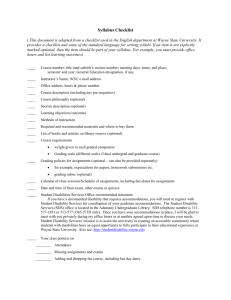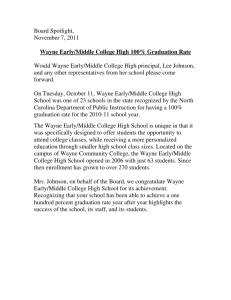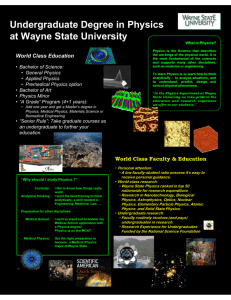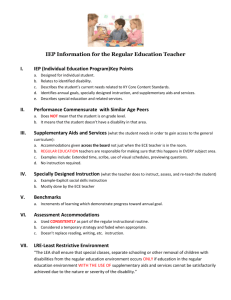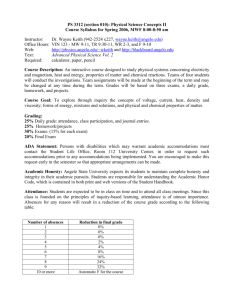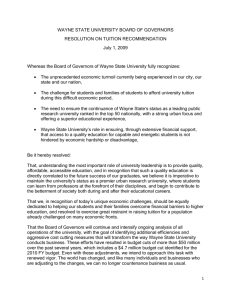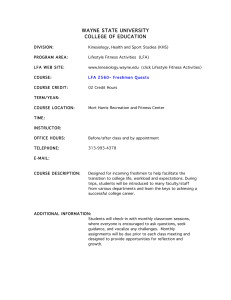ABET Format Syllabus for ECE 5690
advertisement
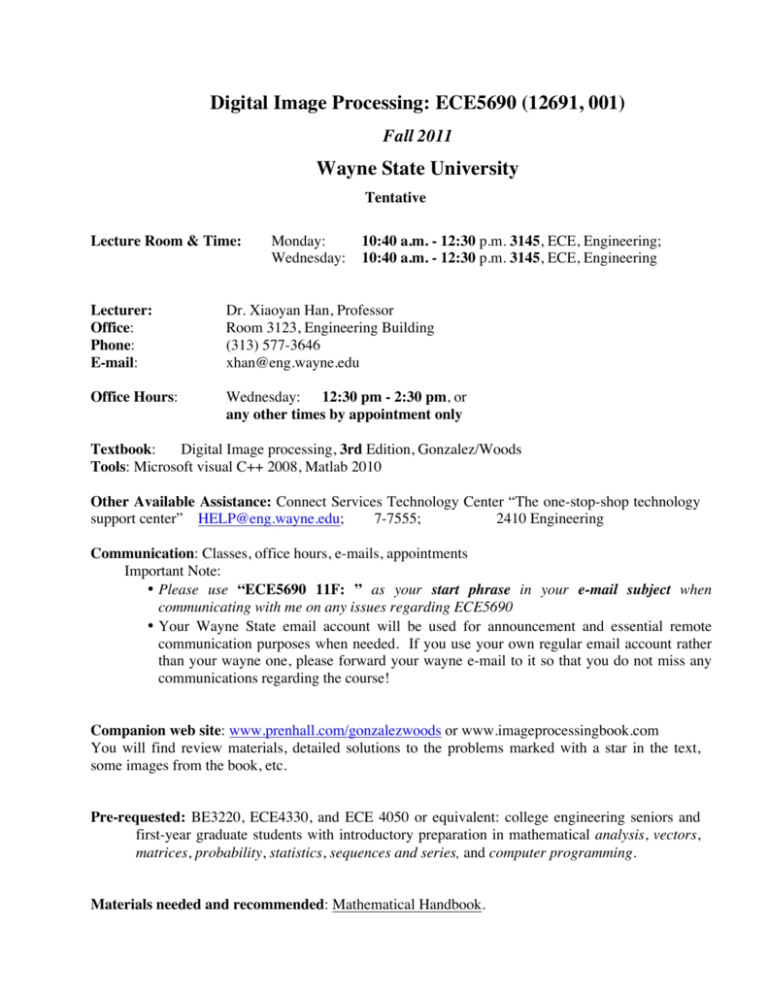
Digital Image Processing: ECE5690 (12691, 001) Fall 2011 Wayne State University Tentative Lecture Room & Time: Monday: Wednesday: 10:40 a.m. - 12:30 p.m. 3145, ECE, Engineering; 10:40 a.m. - 12:30 p.m. 3145, ECE, Engineering Lecturer: Office: Phone: E-mail: Dr. Xiaoyan Han, Professor Room 3123, Engineering Building (313) 577-3646 xhan@eng.wayne.edu Office Hours: Wednesday: 12:30 pm - 2:30 pm, or any other times by appointment only Textbook: Digital Image processing, 3rd Edition, Gonzalez/Woods Tools: Microsoft visual C++ 2008, Matlab 2010 Other Available Assistance: Connect Services Technology Center “The one-stop-shop technology support center” HELP@eng.wayne.edu; 7-7555; 2410 Engineering Communication: Classes, office hours, e-mails, appointments Important Note: • Please use “ECE5690 11F: ” as your start phrase in your e-mail subject when communicating with me on any issues regarding ECE5690 • Your Wayne State email account will be used for announcement and essential remote communication purposes when needed. If you use your own regular email account rather than your wayne one, please forward your wayne e-mail to it so that you do not miss any communications regarding the course! Companion web site: www.prenhall.com/gonzalezwoods or www.imageprocessingbook.com You will find review materials, detailed solutions to the problems marked with a star in the text, some images from the book, etc. Pre-requested: BE3220, ECE4330, and ECE 4050 or equivalent: college engineering seniors and first-year graduate students with introductory preparation in mathematical analysis, vectors, matrices, probability, statistics, sequences and series, and computer programming. Materials needed and recommended: Mathematical Handbook. Objective: Provide an introduction to basic concepts and methodologies for digital image processing, to develop a foundation that can be used as the basis for further study and research in this field. Topics: Part I: Important concepts for a basic understanding of image processing. This part includes: elements of digital image processing such as pixel, image and data formats, and solid state camera systems. Part II: Image analysis typically applied in DIP, addressing techniques that rely more heavily upon mathematical tools, which includes image transforms, filtering techniques, data sampling, etc. Part III: Addresses applications. More specifically, which deals with current image processing techniques, including image enhancement, image restoration, data compression, etc. Homework: Homework problems are assigned regularly. The assignments are intended to increase your understanding of the course material. It is very important that you work out the solutions to each problem and understand clearly the correct method of solution. Homework due one week after the corresponding chapter is finished. Homework will be collected randomly during the semester and recorded (No late homework will be collected). Students are encouraged to form study groups and work together on homework problems. Term Project: Term projects will be suggested during the semester. It is an important part of the image processing course. These projects give the students hands-on experience with algorithm implementation and reinforce materials covered in the classroom. You need to know how to program with C++ in Microsoft Visual Studio 2008, or with Matlab 2010 ( All these tools are installed in classrooms 2351, 2359, 2360, 2409). Student Outcomes: By studying the subjects taught in this course, the students will attain the course educational objectives demonstrated on the following aspects: (a) An ability to apply knowledge of mathematics, science, and engineering (b) An ability to design and conduct experiments via computer programming, as well as to analyze and interpret data (c) An ability to design a working software package for digital image processing to meet desired needs within realistic constraints in digital images. (d) An ability to function on multidisciplinary teams (e) An ability to identify, formulate, and solve engineering problems (f) An understanding of professional and ethical responsibility (g) An ability to communicate effectively (h) The broad education necessary to understand the impact of engineering solutions in a global, economic, environmental, and societal context (i) A recognition of the need for, and an ability to engage in life-long learning (j) A knowledge of contemporary issues (k) An ability to use the techniques, skills, and modern engineering tools necessary for engineering practice. (l) In this course, students also gain the ability of building up logic thinking and reasoning via design scientific approaches to real world engineering problems (l) In this course, students also gain the ability of applying common sense while dealing engineering problems. Exams, and Grading: The grades for this course will be determined by your performance on the exam, assignments, and the term project. Project presentation is required. The written exam will be closed book. No makeup exams! Special Assignments Written Exam 10% 45% During the semester Wednesday, Dec. 7, 2011, 10:40-12:40, Old Main 0151; Course Project 45% Mid term review Final Package Due on Wednesday, December 14, 2011 I: be reviewed in the mid-term (to be scheduled) II: Presentation: December 12, last class day III: Team Demo: December 12 TOTAL 100% Withdrawal: Students need to be aware of the University withdrawal policy. FAILING of a class is NOT an acceptable excuse for withdrawal. Academic Dishonesty: Cheating and other forms of dishonesty will not be tolerated. Besides being unfair to other students, such behavior is an insult to the faculty who put in the time and effort into making this an interesting and useful course. Anyone found cheating on any activity would receive a zero for that part of his or her grade. It is the responsibility of each student to adhere to the principles of academic integrity. Academic integrity means that a student is honest with him/herself, fellow students, instructors, and the University in matters concerning his or her educational endeavors. Thus, a student should not falsely claim the work of another as his/her own, or misrepresent him/herself so that the measures of his/her academic performance do not reflect his/her own work or personal knowledge. In this regard, cheating will not be tolerated. Cheating includes (but is not limited to) any communication (written or oral) during examinations and sharing of work, such as using the same models or computer programs or copying work. All homework and projects must be an individual effort unless specifically noted. STUDENTS WHO CHEAT ON ANY ASSIGNMENT OR DURING ANY EXAMINATION WILL BE ASSIGNED A FAILING GRADE FOR THE COURSE. Therefore avoid all appearance of improper behavior! Students who witness cheating should report the incident to the instructor as soon as possible. Students are also welcome to discuss any concerns related to cheating with Dr. Yang Zhao, Chair of the Electrical and Computer Engineering Department. Educational Accessibility Services: If you feel that you may need an accommodation based on the impact of a disability, please feel free to contact me privately to discuss your specific needs. Additionally, the Office of Educational Accessibility Services (EAS) coordinates reasonable accommodations for students with documented disabilities. The Office is located in the Student Center Building, Room 583, Phone: 313-577- 1851 (Voice)/577-3365 (TTY). Policy on Classroom Attendance: All students are expected to attend all lectures, and examinations with enthusiasm. Although classroom attendance does not mathematically contribute to the final course grade, active class participation is expected of all students and may help to boost up the course grade in those “borderline” cases” between failing and passing. It is recognized that students may be required to miss classes on occasion as a result of their participation in approved University activities. Examples of such activities include formal participation on University sports teams, debate teams, and performing arts groups. These activities are generally directed by a University official, such as a coach, and usually have a set schedule of events. Students participating in approved University activities should consult with instructors prior to registration, but no later than the end of the second week after the start of classes, to determine the class attendance policy. At this time, the student should provide the instructor with a schedule of planned absences, preferably signed by the University official directing the activity (e.g., Athletic or Program Director or his/her designee), in order to allow the instructor to evaluate and advise the student on the possible impact of the planned absences. In this case, the instructor will consider absences due to participation in approved University activities, as outlined above, to be excused absences, on par with those due to other unavoidable circumstances such as illness and work-related travel. It is the student's responsibility to learn the course material. When classes are missed, for whatever reason, it is the obligation of the students to obtain copies of the class materials and students are responsible for all materials covered in the lectures. An excused absence does not excuse the student from completing assigned work, including exams. Disability: If you have a documented disability that requires accommodations, you will need to register with Student Disability Services for coordination of your academic accommodations. The Student Disability Services (SDS) office is located at 1600 David Adamany Undergraduate Library in the Student Academic Success Services department. SDS telephone number is 313-577-1851 or 313577-3365 (TDD only). Once you have your accommodations in place, I will be glad to meet with you privately during my office hours to discuss your special needs. Student Disability Services’ mission is to assist the university in creating an accessible community where students with disabilities have an equal opportunity to fully participate in their educational experience at Wayne State University. Please refer to the SDS website for further information about students with disabilities and the services we provide for faculty and students: http://studentdisability.wayne.edu/ Note: Please follow the University Calendar for Important Days, such as: • Last day registration/add • Tuition cancellation • Last day for dropping classes Policy on withdrawal and the corresponding grading. Enjoy the Course!
